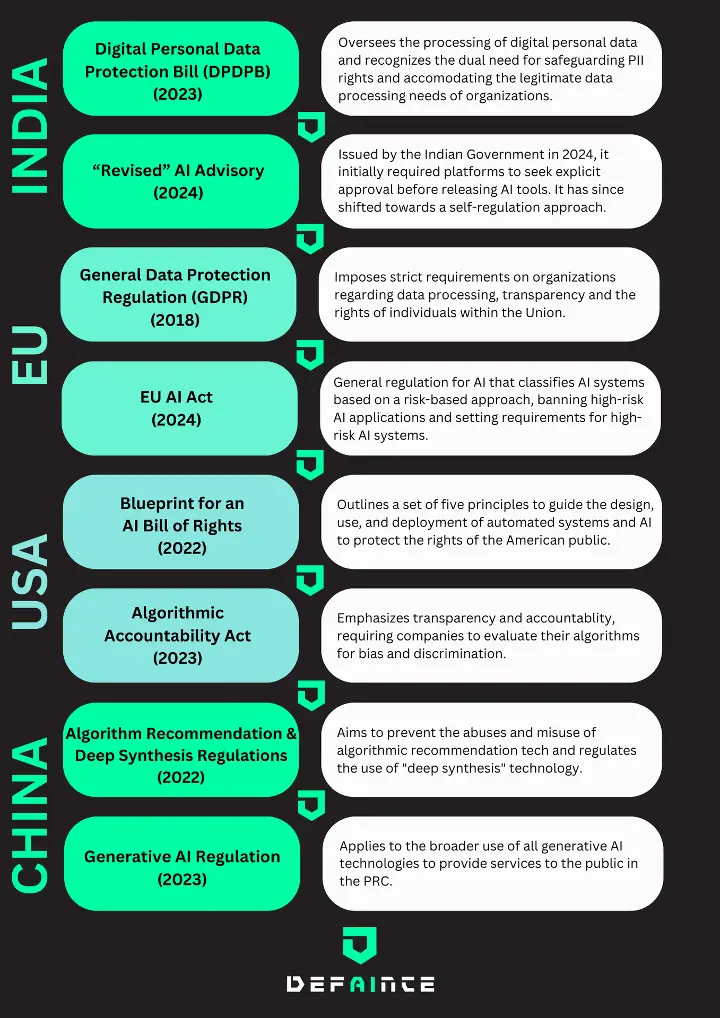
Image: Unsplash - Pawel Czerwinski
What exactly is AI Compliance?
AI governance and compliance serve as the playbook that guides ethical and lawful AI practices, ensuring responsible behavior within the boundaries of ethics and regulations. It's like setting up the ground rules for AI to play fair, act ethically, and stay on the right side of the law.
When we talk about AI compliance, we're diving into a world of:
- Policies and Standards: Think of this as laying down the ground rules - defining ethical principles, data usage do's and don'ts, and making sure there's someone answerable when things go sideways.
- Risk Management: It's like having a crystal ball to foresee potential AI risks - from bias to privacy slip-ups - and then putting safeguards in place to steer clear of trouble.
- Transparency and Accountability: This is all about shedding light on how AI decisions are made. It's like showing your work in math class - documenting how models are built, where the data comes from, and why AI made that call.
- Data Governance: Keeping the data game strong by ensuring AI gets top-notch, secure data while respecting privacy. It's like having a bouncer at the data party - making sure only the right stuff gets in.
- Compliance with Regulations: Making sure AI plays by the rules set by the bigwigs like GDPR or HIPAA. It's like having regular check-ups to ensure everything's on the up and up, fixing any slip-ups along the way.
What current frameworks exist for AI Compliance?
In the last few years, an increasing number of countries worldwide have been designing and implementing AI governance legislation and policies.
Below are some of the most prominent ones, with the EU AI Act being the world's first comprehensive AI law globally (not the first AI regulation ever, as illustrated).
While China had regulations in 2023 addressing AI and the US a "Blueprint" back in 2022, the EU AI Act distinguishes itself by being a pioneering legislation that provides a detailed framework for regulating general artificial intelligence (within the European Union).
In a nutshell:
While the European Union has taken a pioneering step with the EU AI Act, which is considered the world's first comprehensive legal framework for regulating AI, China has implemented more targeted regulations, such as the Algorithm Recommendation Regulation and the Deep Synthesis Regulation, which focus on specific AI applications like algorithmic recommendation and generative AI.
The United States, on the other hand, has not yet enacted a unified federal AI law, but has introduced various executive orders, guidelines, and proposed bills to address AI-related concerns on a more piecemeal basis.
When it comes to India, the country had initially required developers of generative AI models to seek government approval, but a recent advisory shifted towards self-regulation, encouraging developers to label potentially risky AI-generated content instead.
Meanwhile, countries like the UK and Switzerland have opted for pro-innovation, more flexible, selective approaches, integrating AI-specific provisions into existing laws and regulations rather than developing standalone AI legislation.
Overall, the global landscape of AI regulation is evolving very rapidly, with different regions taking diverse approaches to balance innovation, risk and mitigations in alignment with their own national values and priorities.
Why is AI Compliance important?
Organizations must establish safeguards over their use of AI for compliance. It is non-negotiable for companies to make sure that their AI usage complies with relevant laws and regulations.
Here are some reasons why AI compliance is necessary:
1. Ethical use of technology
AI compliance is crucial for upholding ethical standards in technology, preventing biases, discriminatory practices, and privacy violations.
2. Strengthening risk mitigation
Ensuring AI regulatory compliance is also essential for managing risks and avoiding legal consequences such as fines and penalties.
3. Fostering consumer trust
Adhering to AI compliance standards is key for earning user trust and shows a dedication to responsible AI use and transparency, building positive relationships between all stakeholders involved.
4. Enhancing data protection
AI applications often process vast amounts of personal data, risking privacy violations if regulations are not followed. Non-compliance can lead to mishandling or unauthorized access to sensitive information.
5. Boosting innovation and adoption
Clear compliance frameworks create an environment that encourages organizations to innovate and adopt AI technologies confidently without fear of legal complications.
In conclusion
We get it - the world of AI regulations can be a real patchwork, with different countries and regions taking their own unique approaches. But at the end of the day, it's crucial that we respect these rules and frameworks as these regulations are designed to protect individual's rights, prevent harmful biases and discrimination, and make sure AI is being developed and deployed responsibly.
By ignoring them, we're not only putting our companies at great legal risk, but also eroding public trust in this powerful technology.
Note: For those based in Europe, the EU AI Act website has made a great compliance checker list we'd recommend for anyone to use!
